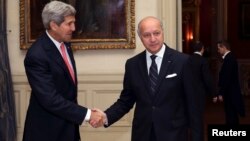PARIS/BRUSSELS —
France is pushing to put allegations of spying by the United States against its European allies on the agenda of a summit Thursday of European leaders in Brussels, said Prime Minister Jean-Marc Ayrault.
Describing the allegations in Le Monde newspaper of mass surveillance of French citizens by the U.S. National Security Agency as “serious” and “shocking,” Ayrault said Europe needed to band together to negotiate with the United States.
“President Francois Hollande has asked that the topic be added to the summit agenda. It is not only a French question but a European one,” Ayrault told parliament on Tuesday. “We need to protect ourselves and must demand that new rules are put in place.”
Washington's European allies have voiced mixed feelings about the reports of extensive spying by the NSA since details of the alleged programs began to surface in June.
In Germany there were protests about the affair, but Chancellor Angela Merkel has not been particularly outspoken in her criticism of Washington.
It remains to be seen whether France's EU partners will agree to a formal discussion of the allegations in light of the Le Monde report.
The paper said on Monday that the NSA recorded 70.3 million items of French telephone data between December 10, 2012, and January 8, 2013, and collected tens of thousands of French phone records.
The targets appeared to be individuals suspected of links to terrorism, but also people tied to French business or politics, the paper said.
France's government summoned the U.S. ambassador over the report and U.S. President Barack Obama discussed the allegations with Hollande by phone. Obama acknowledged “legitimate questions for our friends and allies about how these capabilities are employed”.
There is little consensus among EU member states on whether to confront the U.S. on the issue given that most of them cooperate closely with Washington on intelligence issues.
The October 24-25 summit is expected to focus on ways to foster the digital economy. A copy of draft conclusions for the summit seen by Reuters does not mention U.S. surveillance or the European response to it. The draft was dated October 21 and could still be modified.
Describing the allegations in Le Monde newspaper of mass surveillance of French citizens by the U.S. National Security Agency as “serious” and “shocking,” Ayrault said Europe needed to band together to negotiate with the United States.
“President Francois Hollande has asked that the topic be added to the summit agenda. It is not only a French question but a European one,” Ayrault told parliament on Tuesday. “We need to protect ourselves and must demand that new rules are put in place.”
Washington's European allies have voiced mixed feelings about the reports of extensive spying by the NSA since details of the alleged programs began to surface in June.
In Germany there were protests about the affair, but Chancellor Angela Merkel has not been particularly outspoken in her criticism of Washington.
It remains to be seen whether France's EU partners will agree to a formal discussion of the allegations in light of the Le Monde report.
The paper said on Monday that the NSA recorded 70.3 million items of French telephone data between December 10, 2012, and January 8, 2013, and collected tens of thousands of French phone records.
The targets appeared to be individuals suspected of links to terrorism, but also people tied to French business or politics, the paper said.
France's government summoned the U.S. ambassador over the report and U.S. President Barack Obama discussed the allegations with Hollande by phone. Obama acknowledged “legitimate questions for our friends and allies about how these capabilities are employed”.
There is little consensus among EU member states on whether to confront the U.S. on the issue given that most of them cooperate closely with Washington on intelligence issues.
The October 24-25 summit is expected to focus on ways to foster the digital economy. A copy of draft conclusions for the summit seen by Reuters does not mention U.S. surveillance or the European response to it. The draft was dated October 21 and could still be modified.





